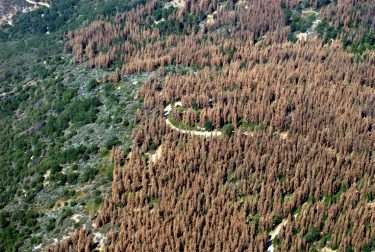
Large swaths of U.S. forests are vulnerable to drought, forest fires and disease. Many local impacts of forest loss are well known: drier soils, stronger winds, increased erosion, and loss of shade and habitat. But if a whole forest disappears, new research shows, this has ricocheting effects in the atmosphere that can affect vegetation on the other side of the country.
A University of Washington-led study published May 16 in Environmental Research Letters shows that forest die-offs in specific regions of the United States can influence plant growth in other parts of the country. The largest impacts seen were from losing forest cover in California, a region that is currently experiencing dramatic tree mortality.
“These smaller areas of forest can have continental-scale impacts, and we really need to be considering this when we’re thinking about ecological changes,” said first author Abigail Swann, a UW assistant professor of atmospheric sciences and biology.
Read more at UW Today »
